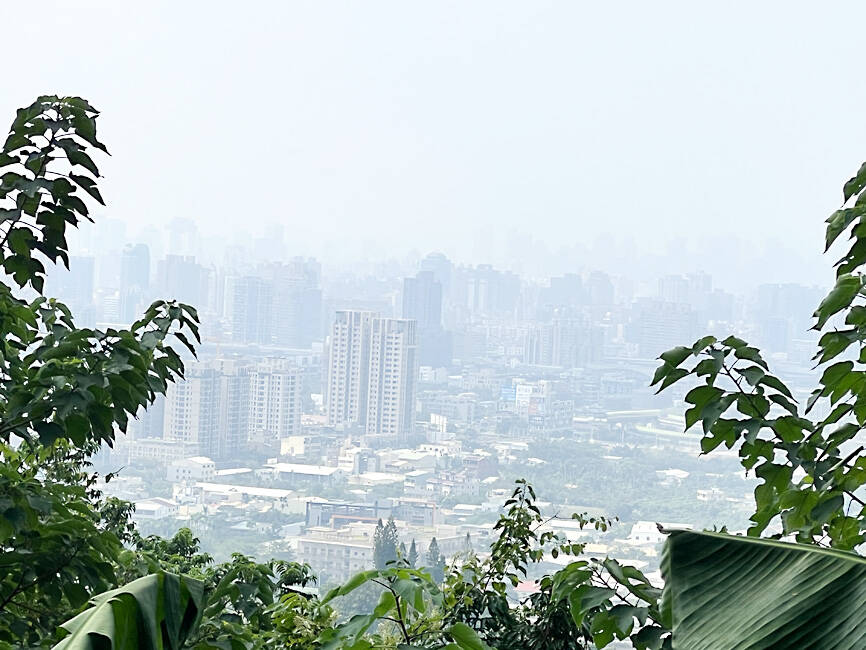The government is to raise the air quality standard in central and southern Taiwan after air pollution prevention measures enforced over the past seven years have demonstrated success in reducing the mean concentration of fine particulate matter (PM2.5) in the two regions, the Ministry of Environment said yesterday.
The ministry issued a statement after the Southern Taiwan Anti-Air Pollution Alliance held a protest in Kaohsiung yesterday.
Protesters said that they have a right to breathe clean air just as much as residents in other parts of the country and demanded that the government honor that right by stopping coal burning at the Hsinta Power Plant in Kaohsiung.

Photo: Liao Yao-tung, Taipei Times
The national mean concentration of PM2.5 had reduced from 20mg/m2 in 2016 to 13.9mg/m2 last month, while the mean concentration of PM2.5 in central and southern Taiwan had fallen from 23.7mg/m2 to 16.4mg/m2, the ministry said, citing data collected from its air quality observation stations.
Air quality in both categories showed a 30 percent improvement, the ministry said.
Phase I of the Air Pollution Prevention action plan, which has been implemented since 2020, has tackled air pollution from pollutants emitted from factories, motor vehicles, construction sites and other sources, the ministry said.
The most significant results were shown in state-run companies under the Ministry of Economic Affairs, which have introduced measures to mitigate air pollution caused by the companies, the ministry said.
Overall, pollutants emitted from Taichung Power Plant, Hsinta Power Plant, China Steel Corp and CSBC Corp have decreased by more than 50 percent, it said.
Air pollutants emitted from coal-fired Taichung and Hsinta Power Plants dropped more than 60 percent, due to a reduction in the amount of coal burned by more than 7 million tonnes and the enhanced efficiency of equipment used to curb air pollution, the ministry said.
Of the four coal-fired power generators in Hsinta Power Plant, the No. 1 generator was discharged in September and the No. 2 generator is to retire by the end of this year, while the No. 3 and No. 4 generators would become backup generators and would not be reactivated until power operating reserves drops below 8 percent, it said. Since 2016, the ministry has helped retire 70,000 old and large diesel-powered vehicles, while the number of old motorbikes has dropped from 6.98 million in 2007 to 2.66 million this year, it said.
Local governments across the country helped create 63 air quality maintenance zones to curb air pollution stemming from the transportation system, the ministry said.
Meanwhile, chromium, arsenic and cadmium in the concentration of PM2.5 decreased by 39 percent, 58 percent and 60 percent from 2017 to last year, respectively.
The Phase II Air Pollution Prevention action plan, which is to be implemented from next year to 2027, has been approved in October by the National development Council and awaits approval from the Executive Yuan.
The goal is to further reduce the mean concentration of PM2.5 in central and southern Taiwan to 15mg/m2, the ministry said.

Chinese Nationalist Party (KMT) Chairman Eric Chu (朱立倫), spokeswoman Yang Chih-yu (楊智伃) and Legislator Hsieh Lung-chieh (謝龍介) would be summoned by police for questioning for leading an illegal assembly on Thursday evening last week, Minister of the Interior Liu Shyh-fang (劉世芳) said today. The three KMT officials led an assembly outside the Taipei City Prosecutors’ Office, a restricted area where public assembly is not allowed, protesting the questioning of several KMT staff and searches of KMT headquarters and offices in a recall petition forgery case. Chu, Yang and Hsieh are all suspected of contravening the Assembly and Parade Act (集會遊行法) by holding

PRAISE: Japanese visitor Takashi Kubota said the Taiwanese temple architecture images showcased in the AI Art Gallery were the most impressive displays he saw Taiwan does not have an official pavilion at the World Expo in Osaka, Japan, because of its diplomatic predicament, but the government-backed Tech World pavilion is drawing interest with its unique recreations of works by Taiwanese artists. The pavilion features an artificial intelligence (AI)-based art gallery showcasing works of famous Taiwanese artists from the Japanese colonial period using innovative technologies. Among its main simulated displays are Eastern gouache paintings by Chen Chin (陳進), Lin Yu-shan (林玉山) and Kuo Hsueh-hu (郭雪湖), who were the three young Taiwanese painters selected for the East Asian Painting exhibition in 1927. Gouache is a water-based

Taiwan would welcome the return of Honduras as a diplomatic ally if its next president decides to make such a move, Minister of Foreign Affairs Lin Chia-lung (林佳龍) said yesterday. “Of course, we would welcome Honduras if they want to restore diplomatic ties with Taiwan after their elections,” Lin said at a meeting of the legislature’s Foreign Affairs and National Defense Committee, when asked to comment on statements made by two of the three Honduran presidential candidates during the presidential campaign in the Central American country. Taiwan is paying close attention to the region as a whole in the wake of a

OFF-TARGET: More than 30,000 participants were expected to take part in the Games next month, but only 6,550 foreign and 19,400 Taiwanese athletes have registered Taipei city councilors yesterday blasted the organizers of next month’s World Masters Games over sudden timetable and venue changes, which they said have caused thousands of participants to back out of the international sporting event, among other organizational issues. They also cited visa delays and political interference by China as reasons many foreign athletes are requesting refunds for the event, to be held from May 17 to 30. Jointly organized by the Taipei and New Taipei City governments, the games have been rocked by numerous controversies since preparations began in 2020. Taipei City Councilor Lin Yen-feng (林延鳳) said yesterday that new measures by